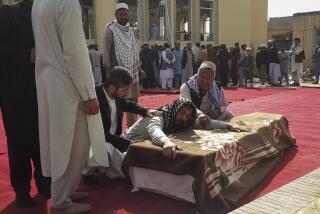Bush Refuses Karzai on Troops, Captives
- Share via
WASHINGTON — President Bush promised Monday to continue U.S. military and economic aid to Afghanistan, but resisted pressure from Afghan President Hamid Karzai to yield control of Afghan prisoners and U.S. military operations in the country.
After a White House meeting, the two leaders released a joint statement declaring their countries strategic partners. But on two subjects that have recently caused friction, Bush said that U.S. troops must report to American commanders, and that prisoners would be released only when U.S. authorities were convinced that their native country could properly guard and care for them.
“Of course, our troops will respond to U.S. commanders,” Bush said.
Although Bush praised the “great progress” made in the training of Afghan troops, he said they were not ready to take the job being handled by 18,000 U.S. and 8,200 allied troops.
Bush said the military relationship between the two countries is “one of cooperate and consult.... We’ll continue to work with the government to train them, and to cooperate and consult with the government.”
Bush said U.S. policy was to “work through” the foreign prisoners held at the U.S. naval base at Guantanamo Bay, Cuba, and repatriate them over time.
Karzai has been one of the Bush administration’s closest allies in its war on terrorism, and his visit was aimed at sealing a long-term U.S. commitment. But many Afghans are upset at the treatment of detainees from their country, and Karzai has said it is time for his government to take control of prisoners and the operations of foreign troops. U.S. forces should not go into an Afghan’s home unless they have permission from the Afghan government, he has said.
Although he made no visible headway with Bush in these areas, Karzai sought to smooth over differences.
Karzai said that Afghans don’t blame the U.S. for the retracted report in Newsweek magazine about Koran desecration at Guantanamo Bay. The report triggered riots in Afghanistan, Pakistan and Indonesia; at least 14 people died in protests in Afghanistan.
“We are, as Muslims, very much unhappy with Newsweek bringing in a matter so serious in the gossip column,” he said. “But Newsweek’s story is not America’s story. That’s what we understand in Afghanistan.”
Karzai also said the United States was not responsible for the abuse of Afghan prisoners, alluding to reports that U.S. troops have mistreated detainees in his country.
“It does not reflect at all on the American people,” he said. “On the contrary, it’s an individual act.”
Karzai’s principal goal in the meeting was to win a promise that the administration would continue its support after a 3-year-old international commitment for support of Afghanistan ends in the fall. The Afghan government controls the capital city of Kabul, but much of the country is beset by violence, warlordism and a soaring drug trade.
Karzai said that when the Afghan parliament is elected in September, “Afghanistan will not suddenly stand on its own feet .... in terms of institutions, Afghanistan will continue to need a lot of support.”
Bush and Karzai signed and released a joint declaration of the United States-Afghanistan strategic partnership. The partnership’s goal, it said, would be to “strengthen U.S.-Afghan ties and help ensure Afghanistan’s long-term security, democracy and prosperity.”
But some analysts said the document did not include specific commitments that Karzai may have hoped to get. It gave no hint of how long the U.S. would be willing to stay in the country.
“This is a pretty generic document,” said Mark Schneider, a former U.S. development official who is senior vice president of the International Crisis Group in Washington, a nonprofit organization that deals with conflict resolution. “It’s pretty thin gruel.”
On other subjects, Bush said he and Karzai discussed the threat posed by drug growers and traders in Afghanistan.
Although some experts have made dire predictions about Afghanistan becoming a “narco-state,” Karzai said he hoped opium poppy cultivation would fall 20% to 30% this year.
“If this trend continues, we’ll have no poppies, hopefully, in Afghanistan in another five or six years,” he said.
More to Read
Sign up for Essential California
The most important California stories and recommendations in your inbox every morning.
You may occasionally receive promotional content from the Los Angeles Times.











